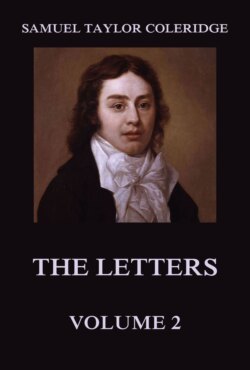Читать книгу The Letters Volume 2 - Samuel Taylor Coleridge - Страница 24
На сайте Литреса книга снята с продажи.
ОглавлениеCLXIV. TO SIR H. DAVY.
September 11, 1807.
... Yet how very few are there whom I esteem and (pardon me for this seeming deviation from the language of friendship) admire equally with yourself. It is indeed, and has long been, my settled persuasion, that of all men known to me I could not justly equal any one to you, combining in one view powers of intellect, and the steady moral exertion of them to the production of direct and indirect good; and if I give you pain, my heart bears witness that I inflicted a greater on myself,—nor should I have written such words, if the chief feeling that mixed with and followed them had not been that of shame and self-reproach, for having profited neither by your general example nor your frequent and immediate incentives. Neither would I have oppressed you at all with thismelancholy statement, but that for some days past I have found myself so much better in body and mind, as to cheer me at times with the thought that this most morbid and oppressive weight is gradually lifting up, and my will acquiring some degree of strength and power of reaction.
········
I have, however, received such manifest benefit from horse exercise, and gradual abandonment of fermented and total abstinence from spirituous liquors, and by being alone with Poole, and the renewal of old times, by wandering about among my dear old walks of Quantock and Alfoxden, that I have seriously set about composition, with a view to ascertain whether I can conscientiously undertake what I so very much wish, a series of Lectures at the Royal Institution. I trust I need not assure you how much I feel your kindness, and let me add, that I consider the application as an act of great and unmerited condescension on the part of the managers as may have consented to it. After having discussed the subject with Poole, he entirely agrees with me, that the former plan suggested by me is invidious in itself, unless I disguised my real opinions; as far as I should deliver my sentiments respecting the arts, [it] would require references and illustrations not suitable to a public lecture room; and, finally, that I ought not to reckon upon spirits enough to seek about for books of Italian prints, etc. And that, after all, the general and most philosophical principles, I might naturally introduce into lectures on a more confined plan—namely, the principles of poetry, conveyed and illustrated in a series of lectures. 1. On the genius and writings of Shakespeare, relatively to his predecessors and contemporaries, so as to determine not only his merits and defects, and the proportion that each must bear to the whole, but what of his merits and defects belong to his age, as being found in contemporaries of genius, and what belonged to himself. 2. On Spenser, including the metrical romances, and Chaucer, though the character of the latter as a manner-painter I shall have so far anticipated in distinguishing it from, and comparing it with, Shakespeare. 3. Milton. 4. Dryden and Pope, including the origin and after history of poetry of witty logic. 5. On Modern Poetry and its characteristics, with no introduction of any particular names. In the course of these I shall have said all I know, the whole result of many years’ continued reflection on the subjects of taste, imagination, fancy, passion, the source of our pleasures in the fine arts, in the antithetical balance-loving nature of man, and the connexion of such pleasures with moral excellence. The advantage of this plan to myself is, that I have all my materials ready, and can rapidly reduce them into form (for this is my solemn determination, not to give a single lecture till I have in fair writing at least one half of the whole course), for as to trusting anything to immediate effort, I shrink from it as from guilt, and guilt in me it would be. In short, I should have no objection at once to pledge myself to the immediate preparation of these lectures, but that I am so surrounded by embarrassments....
For God’s sake enter into my true motive for this wearing detail; it would torture me if it had any other effect than to impress on you my desire and hope to accord with your plan, and my incapability of making any final promise till the end of this month.
S. T. Coleridge.
